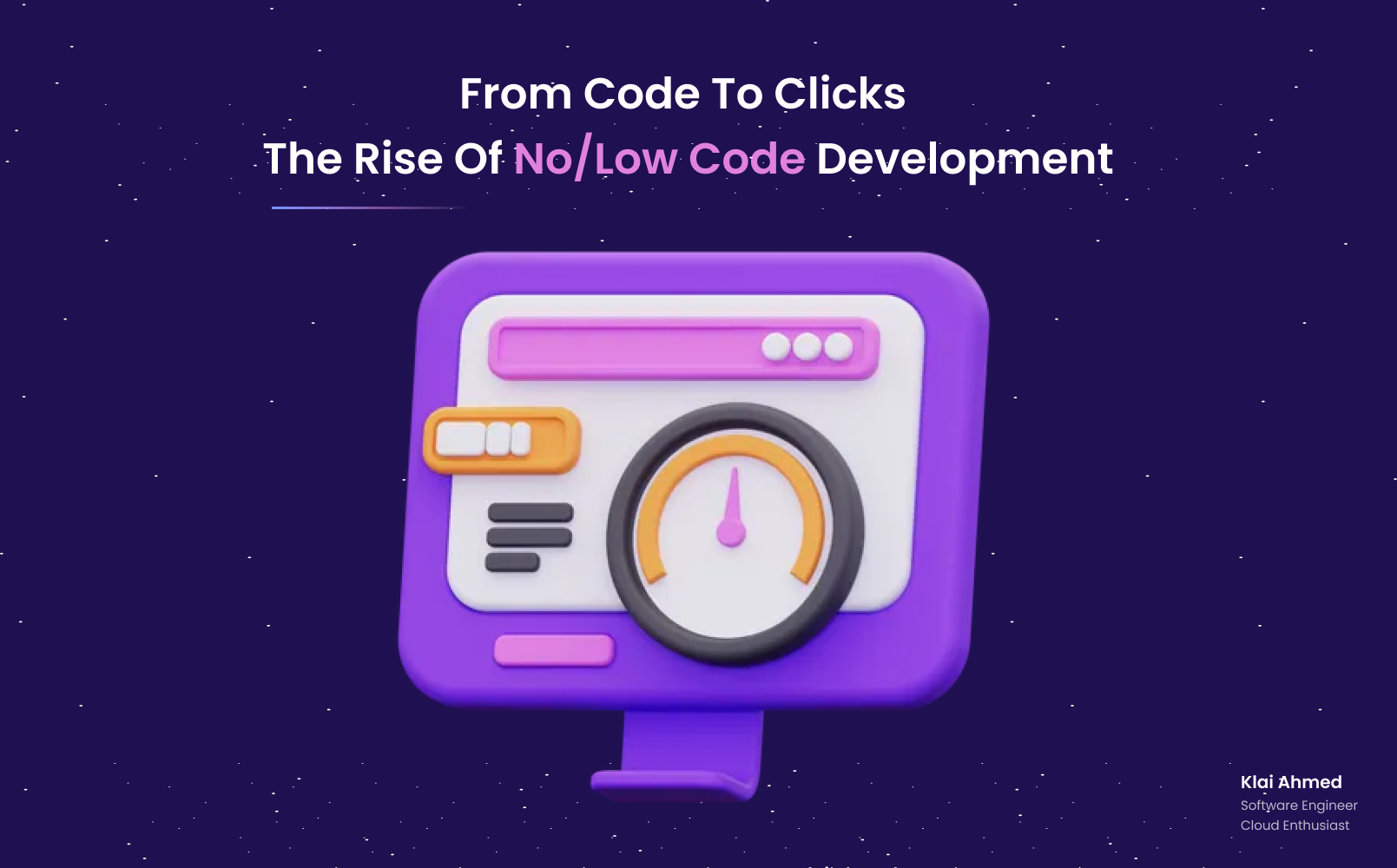From Code to Clicks: The Rise of Low Code Development

As a software engineer, my journey in the realm of technology has been marked by constant innovation and the pursuit of efficiency. Over the years, I've witnessed the transformation of ideas into code, translating creativity and logic into functional applications that power our digital world. Yet, even as the traditional foundations of programming have remained steadfast, a new wave of technological advancement has emerged that challenges the very essence of my role – the rise of low code and no code platforms. Here's our deep dive into no code solutions.
- Introduction
- The Evolution of Software Engineering
- The Rise of Low Code and No Code
- The Impact on Software Engineers
- The Synergy of Low Code, No Code, and Software Engineering
- The Future of Software Engineering
- Conclusion
Introduction
Recently, a casual conversation with a friend deeply entrenched in the medical world, sparked a thought-provoking exchange. He asked, "So, what exactly do you do as a software engineer in this age of low code and no code solutions?" His question hung in the air, igniting a conversation that encapsulates the intersection of technology, innovation, and the evolving landscape of my profession.
To provide context, my friend's inquiry wasn't unwarranted. In a world where platforms boast the ability to create applications with minimal coding – or even without it entirely – it's natural to wonder about the role of a software engineer in this shifting paradigm. This encounter led us to delve into a discussion that not only illuminated the significance of low code and no code platforms but also highlighted the nuances that continue to define the art and science of software development.

Our conversation began with a shared appreciation for the remarkable strides that these platforms have made in democratizing technology. No longer limited to a select group of programmers, the act of crafting software has become more accessible than ever before. My friend's eyes lit up as he recounted how, armed with a no code platform, he had built a basic clinic appointment management system to streamline his practice – a feat that would have seemed distant just a few years ago.
However, as we explored deeper, it became evident that while low code and no code platforms offer expedited routes to application development, they don't entirely replace the expertise that software engineers bring to the table. These platforms are invaluable tools that empower individuals to create, innovate, and solve problems rapidly. Yet, beneath the simplicity lies a delicate balance between customization and constraints, efficiency and complexity.
In the chapters that follow, I invite you to embark on a journey that traverses the evolving landscape of software engineering in the era of low code and no code platforms. We'll explore how these innovations are reshaping traditional roles, accelerating innovation, and redefining the boundaries of creativity.
The Evolution of Software Engineering
Software engineering has always played a big role in making digital things work. It's a field that's always changing, like a river that keeps moving and adapting to new tools and ways of doing things. Nowadays, we're in a time when it's becoming easier to create computer programs without writing a lot of complicated code. But before we get into that, let's take a closer look at how we got here and what it means for people like me who work as software engineers.
A long time ago, when computers were just starting to be used, making them do things was like casting complicated spells. Software engineers had to write every single command, creating intricate instructions that made machines work. It was a bit like writing out a very detailed recipe for a complex dish. This gave a lot of control, but it also required a ton of expertise and took a really long time.
As time went on, things got a bit easier. People invented programming languages, which were like special codes that computers could understand more easily. But even then, you still had to know a lot about these languages, like learning a secret language. Software engineers were like skilled builders, using their knowledge to create and keep up the digital world.
This journey from the early days of complicated commands to the invention of programming languages shows how software engineering has always found ways to make things better and easier. It's like how a path might have twists and turns, but it keeps moving forward.
Understanding this history helps us see why the arrival of low code and no code platforms is such a big deal. These new tools are changing how we make computer programs, and they have the potential to make things even easier. But to really grasp what that means, we need to explore this story further.
The Rise of Low Code and No Code
Now, let's talk about what's happening today. We're witnessing a big change in the world of technology because of low code and no code platforms.
Imagine low code platforms as a set of ready-made building blocks and a step-by-step guide. Instead of starting from scratch, you get to use these building blocks to create something new. It's a bit like having a LEGO set with instructions to build something cool. These platforms make it quicker to build computer programs because you don't have to create everything from the ground up.

No code platforms take things even further. They're like magic wands in the world of technology. You can create things just by pointing, clicking, and telling the computer what you want, without needing to write any special instructions. It's a bit like using a smartphone app – you don't need to know how the app was made; you can just use it to do what you want.
These changes are like a breath of fresh air for people who aren't software experts.
Low code and no code platforms are like magical tools that have opened up new possibilities for all sorts of people. They're changing the way we think about making computer programs and solving problems, making it easier and more accessible for everyone. But there's more to explore about how these changes are impacting the world of software engineering and what role software engineers play in this enchanted landscape.
The Impact on Software Engineers
Now, you might be wondering, in this age of low code and no code solutions, are software engineers fading into the shadows, their skills rendered obsolete? The answer is a resounding no. While these magical platforms have their merits, they do not replace the ancient wisdom and skills of a seasoned software engineer.
Think of software engineers as the guardians of a vast library of knowledge. Within this library, they possess the keys to complex algorithms, the blueprints for structuring and organizing data, and the ability to craft intricate solutions. It's like having access to a treasure trove of wisdom, where each page holds the secrets to solving intricate puzzles.
For example, consider a situation where a business needs a unique system to manage its inventory efficiently. A software engineer can design a customized solution that not only tracks inventory but also predicts when items need to be reordered based on historical data. This level of customization and intelligence goes beyond the capabilities of low code or no code platforms, which might struggle to create such a specialized system.

Moreover, software engineers are like artisans of the digital realm, capable of creating highly personalized spells, or in this case, software applications. Imagine a scenario where a healthcare provider needs a patient management system tailored to their specific needs. A software engineer can craft a solution that not only handles patient records but also integrates seamlessly with medical devices, ensuring accurate and timely data collection. This level of customization is challenging to achieve with off-the-shelf low code or no code tools.
Their mastery extends beyond customization to optimizing performance. Consider a global e-commerce platform that needs to handle millions of transactions daily. A software engineer can fine-tune the system's architecture, databases, and algorithms to ensure speedy and reliable performance, maintaining a seamless shopping experience for users worldwide. Such intricate optimization is often beyond the capabilities of automated low code or no code solutions.
Furthermore, in the realm of security, software engineers are the guardians of enchanted realms. They can build robust security measures into applications, protecting sensitive data and ensuring the safety of online transactions. For instance, a banking application requires a level of security that goes beyond what standard low code or no code platforms can provide. Software engineers implement encryption, authentication, and authorization mechanisms that adhere to the strictest security standards.
Finally, consider scaling magical creations. In a scenario where a social media platform experiences rapid user growth, a software engineer can orchestrate the expansion of the platform's infrastructure, ensuring it can accommodate the surge in users seamlessly. This level of scalability and efficiency is a hallmark of software engineering expertise, allowing digital realms to expand without hiccups.
The Synergy of Low Code, No Code, and Software Engineering
In reality, low code and no code platforms are not rivals to software engineers; they are allies in this mystical journey of digital creation. These platforms empower individuals to swiftly prototype and experiment with ideas, solving problems with a speed that resembles the efficiency of a well-crafted spell. However, there are limits to what can be achieved without diving into the ancient scrolls of coding, and this is where software engineers step in as the wise sages.

Imagine you have a brilliant idea for a mobile app. Using a no code platform, you quickly piece together a basic version of the app, complete with buttons and simple functions. It's like sketching the outline of a painting. It's fast and helps you see if your idea has potential.
However, as you envision the app growing and becoming more complex, you realize you need some special features:
- You need the app to communicate with other services.
- You need to analyze data.
- You need to adapt to different screen sizes.
This is where the expertise of software engineers comes into play. They can take your basic outline and turn it into a full-fledged, powerful application. It's like turning that simple sketch into a breathtaking masterpiece through intricate detail and craftsmanship.
Software engineers can blend the capabilities of low code and no code platforms with their deep knowledge. They use these tools to quickly build prototypes, test concepts, and even automate certain parts of their work. It's like having a magical assistant that helps with the initial steps of a complex spell, allowing the wizard to focus their energy on the most challenging and creative aspects of the enchantment.
The Future of Software Engineering
Now it becomes evident that the role of a software engineer is evolving. The mystical landscape of software development is expanding to encompass a wider range of magical abilities and expertise.
In this age of low code and no code platforms, software engineers will continue to be the guiding wizards, leading the way to cutting-edge solutions. They will use their magical expertise to customize, optimize, and seamlessly integrate these platforms, tailoring them to meet the unique needs of businesses and users.
Imagine a group of people, each with their own unique skills, coming together to create something amazing. The software engineer brings their deep technical knowledge, the designer adds a touch of elegance, the business expert ensures it meets real-world needs, and the end-users provide valuable feedback. It's like a fellowship of adventurers embarking on a quest, each contributing their strengths to achieve a common goal.
This collaboration and diversity of skills are shaping the future of software engineering. It's not just about writing code anymore; it's about solving complex problems, sparking creativity, and making technology work for everyone. As we move forward, software engineers will remain at the forefront of this mystical journey, helping us unlock the full potential of the digital realm.
Conclusion
The rise of low code and no code platforms is not a threat to software engineers but a testament to the adaptability of the mystical field. It's an enchanting era where magic is more accessible to all, and software engineers are the enchanters leading the way.
So, when my friend asked what I do as a software engineer in the age of low code and no code solutions, I replied, "I embrace innovation, collaborate with diverse teams, and harness these magical tools to craft solutions that push the boundaries of what technology can achieve." The essence of software engineering remains unchanged – it's about solving complex problems, but now, we have more mystical tools at our disposal than ever before. It's a captivating time to be a software engineer, and the magical journey is far from over.

